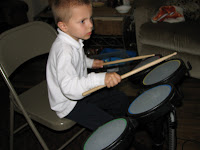 What do you want to be when you grow up?
What do you want to be when you grow up?It's a typical question aimed at kids. Many answers come out of the mouths of babes - a ballerina, a teacher, an astronaut, a cowboy. These answers grow and change as our kids do. Malcolm is only 6 and has had many career aspirations, although "gym teacher" seems to be the more long-lasting answer.
I've seen parents try to nurture these aspirations by sticking their kids in special classes or private instruction. The problem is, at a young age our kids often show promise at a number of activities - so we try to nurture them all, resulting in the ridiculous over-scheduling that permeates middle class America. And our kids are likely to end up with the dilemma I had when graduating high school - having that ever-present question looming large with so many choices it's nearly unbearable: What do I want to be when I grow up?
The problem is, when you are on the precipice of the college years, you are grown up, essentially. Old enough to vote, make your own decisions, move out of your parents' house...and make your own mistakes. Yet, with adulthood almost thrust upon us at this age, very few of us know what the heck we want the rest of our lives to look like. I'm sure some of this is just the age and the design of our lives - we are encouraged to experiment with different hobbies, sports, and vocations - to "broaden our horizons" and experience the world so we can make a well-informed decision. I've read a lot lately about how too much choice is actually crippling to humans, and has led to a number of unforeseen problems. However, I would assert that this vast openness of choice and opportunity is not really the main issue keeping many of us from reaching our full potential - the word "should" is. (side note: my husband, when reading this, just smiled that I used the phrase "I would assert" and will need to pause and regroup before reading on...)
Anyway...the word SHOULD. What an interesting word. We often use it in corrective instruction: "You should not have pulled the cat's tail." "You should apologize." But we also use it when giving our opinion of how our children should (ha) live their lives, including choosing a career. Is there really any surprise that "You should take violin lessons!" or "You should join the soccer team!" might be received with a little less levity than intended? After all, earlier that same morning, we told them they "should" not say that bad word, or they "should" not have hit their friend. Should carries much more weight than I think any of us realize. Thus, when kids reach the age of having to make a decision of the direction of their lives, the thought "What do I want to be when I grow up?" carries more the weight of "What SHOULD I do with my life?" Which may seem like the same basic idea, but that word "should" adds a different weight to the question.
I bring this up because, at just 6 years of age, my son has already been "shoulded" a lot. He's been told he should join a soccer team, take gymnastic lessons, take musical instrument lessons, take special art classes...all because he has shown promise in these areas. Now, I realize that the people saying these things (including Mom and Dad) have no ill intent, but I have to wonder if all this "shoulding" adds a level of obligation and expectation to our choices. After all, if I have been told that I should sing on the worship team because I have a nice singing voice, and I choose not to do so, am I not letting someone down? Am I possibly even turning my back on a G_d-given talent?
I have spent many years trying to unravel the strings of "should." That single word has hung over me like a cloud, while I have tried to figure out what I "should" do with my life, rather than what I want to do. What I desire to do. Trust me, I recognize our collective obligation to society as a whole, and the importance of every person's role in community. However, if an individual is fundamentally unhappy and unfulfilled doing something they "should" do rather than something they feel passionate about doing, then are they truly being a constructive participant in community?
My desire is to give my son as much support and as little "should" as possible. I don't know yet what that looks like, but I hope that I don't squash his dreams or skew his view of what careers and lifestyles are acceptable to pursue because of what I think he should do with his life.
What about you? Have you been "shoulded"? How can we not "should" our kids?


This is a fantastic entry! As I was reading this, I thought of people I knew who had experienced this, and to some extent myself included. This reads so well, it feels like an excerpt from a book. Really great piece.
ReplyDeleteI concur with Josh - great piece!
ReplyDeleteThanks guys.
ReplyDelete